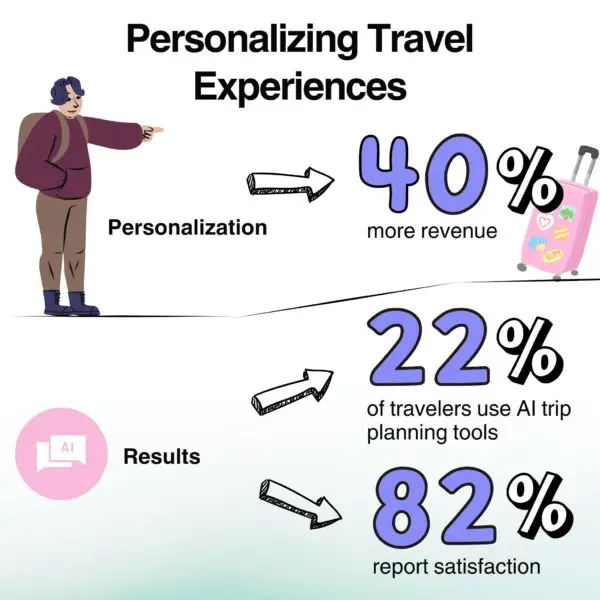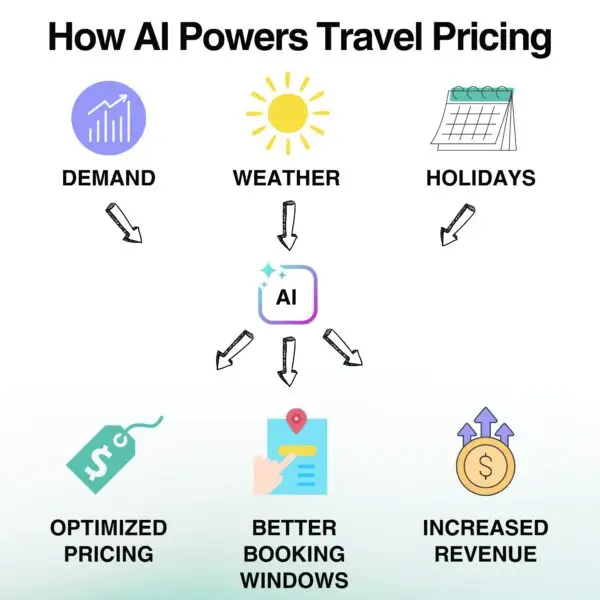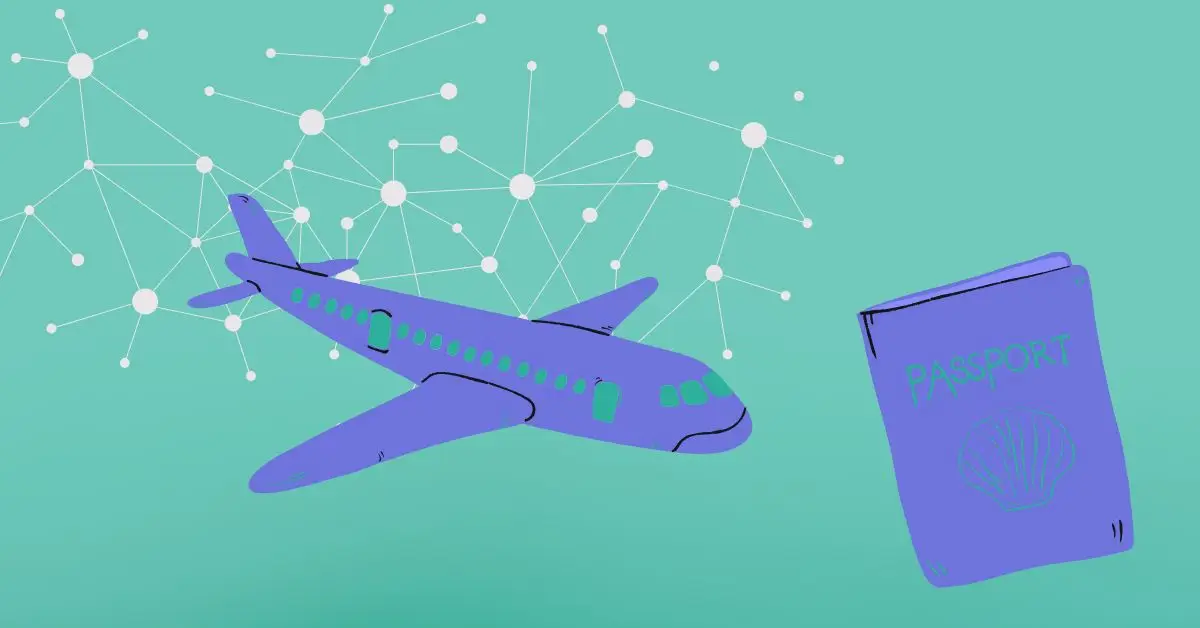Why AI for Travel Agency Is a Big Part of the Future
The travel industry is no longer operating on gut instinct and manual spreadsheets. Today, AI is reshaping how travel agencies serve clients, forecast trends, and stay competitive in a market where speed and personalization are everything. From dynamic pricing and multilingual support to automated trip planning and fraud detection, “AI for travel agency”, is fundamentally transforming the way travelers and agencies operate—and the technology they have to apply in order to thrive.
For travel professionals, adopting AI isn’t just about keeping up—it’s about staying ahead. AI enables agencies to handle more bookings with fewer resources, deliver personalized experiences at scale, and make smarter, faster decisions powered by data. It allows teams to automate repetitive tasks, free up staff for high-value service, and unlock new levels of efficiency that were unimaginable just a few years ago.
This blog explores six high-impact applications of AI for travel agency operations, backed by real-world use cases, expert perspectives, and actionable insights. Whether you’re looking to streamline customer support, boost booking revenue, or scale globally without scaling headcount, this guide will help you understand where AI fits in—and why it’s the most powerful travel tool of 2025.
1. Personalizing Travel Experiences
Challenge:
Modern travelers expect journeys tailored to their preferences and lifestyles. Traditional tools often fail to deliver the level of relevance that today’s clients demand.
Solution:
AI for travel agency or AI-powered recommendation engines analyze booking history, preferences, and search behavior to deliver hyper-personalized itineraries. These systems continually learn, enabling real-time personalization and smarter upselling.
Impact:
Companies that excel at personalization generate 40% more revenue.
A Lifewire study — shows 22% of travelers now use AI trip planning tools, with 82% reporting satisfaction.
Expert Perspective:
Travel advisors using AI for travel agency workflows can now recommend hidden-gem stays, eco-friendly routes, and local experiences that are difficult to find manually.
Key Benefits:
- Higher engagement and relevance
- Improved conversion from targeted offers
- Greater customer loyalty and retention

Quick Comparison: Traditional vs. AI-Powered Travel Agencies
| AI for Travel Agency Feature | Traditional Agency | AI-Powered Travel Agency |
| Personalization | Manual, limited | Automated, real-time, tailored |
| Customer Support | Office hours only | 24/7 AI chatbots |
| Fraud Prevention | Reactive/manual | Real-time AI detection |
| Pricing Strategy | Static/manual | Dynamic, real-time pricing |
| Multilingual Support | Limited | Instant translation |
| Scalability | Staff-bound | Automated and scalable |
2. 24/7 Support: Chatbots in AI for Travel Agency
Challenge:
Today’s travelers expect instant responses—whether they’re booking a last-minute hotel or needing help with a delayed flight. Human agents can’t scale to meet this always-on demand.
Solution:
AI-powered chatbots are transforming how travel agencies deliver service. These bots operate 24/7 across platforms like websites, WhatsApp, and booking portals—handling everything from itinerary changes to refund requests in real time.
Impact:
- Collaborating with BCG and BCG X, A1 Telekom Austria revolutionized its customer management approach by combining the strengths of humans and AI.
- Smythos highlights that travel chatbots now handle booking management, airport transfers, weather updates, and emergency cancellations—instantly and at scale.
- Zendesk — reports AI chatbots reduce response times, free up human agents, and help travel companies scale support without scaling headcount.
Real-World Example:
During disruptions like volcanic eruptions, agencies using AI chatbots can instantly update clients, rebook travel, and provide support, while those with manual processes struggle to keep up.
Key Benefits:
- Lower operational costs through automation
- Higher satisfaction with always-on support
- Human teams freed to focus on complex, high-value tasks
3. Predictive Analytics & Dynamic Pricing
Challenge:
Forecasting demand and setting optimal prices has always been a mix of art and science—but with AI, it becomes a precision discipline.
Solution:
AI analyzes booking patterns, live demand signals, competitor pricing, weather, holidays, and global events to forecast demand and adjust prices in real time.
✅ Impact & Quotes
- According to BazuCompany “in 2025, static price lists and seasonal tables are outdated—AI-powered dynamic pricing is the new standard.”
- “AI-powered travel dynamic pricing solutions help businesses optimize prices in real‑time by analyzing key factors such as demand, seasonality, competitor prices, and customer behavior,” as noted by Markovate
- According to Kitrum — “Expedia uses AWS … real‑time data processing and rapid adjustments … crucial for dynamic pricing,” enabling competitive flexibility.
- Henrique Veiga explains via a LinkedIn blog — “AI-driven pricing models analyze demand patterns, competitor pricing, and external factors to adjust airfare and hotel rates in real time.”

Experience Insight
Travel agents using predictive analytics tools can spot impending shoulder-season dips or surges and advise clients to book early or late—maximizing both traveler value and agency commission.
AI for Travel Agency Key Benefits
| AI for Travel Agency Benefit | Outcome |
| Revenue Optimization | Dynamic pricing adjusts in real time based on demand and trends |
| Competitive Edge | AI tools analyze competitor pricing instantly, keeping offers aligned |
| Traveler Value | Clients receive fair prices—early-bird or last-minute—optically timed |
| Operational Confidence | Agencies act proactively, not reactively—backed by valid data |
4. AI‑Powered Fraud Detection
Challenge:
Travel agencies face constant fraud threats—stolen credit cards, fake loyalty accounts, price tampering, and more. Manual reviews are too slow and often miss evolving patterns.
Solution:
AI-driven systems monitor bookings and payments in real time, learning from patterns to flag anomalies—much faster and more accurately than old-school rules-based tools.
Verified Impact & Quotes:
- “AI identifies suspicious transactions and behavior patterns in real time, adapting to new fraud threats” —KPMG
- “AI-powered travel & airline fraud management analyzes booking behaviors, loyalty abuse, and credential stuffing to protect revenue and build trust” —TrustDecision
- “Travel payments are complex—cross-border, shared itineraries, mixed services; AI (like Mastercard Decision Intelligence or Stripe Radar) can detect fraud invisibly before it hits the ledger” —Henrique Veiga’s LinkedIn Blog
- “AI-driven fraud systems build dynamic risk profiles using user behavior, transaction context, and anomaly detection—far outperforming manual methods” – PeekPro
Strategic Insight
Agencies using AI fraud detection can reduce chargebacks and scam losses, while maintaining a frictionless experience for genuine travelers. Automated systems also enable proactive flagging and fast case resolution.
📈 Key Benefits of AI for Travel Agency Fraud Detection
| Benefits | Advantages (with Examples) |
|---|---|
| Minimized Fraud Losses | AI for travel agency platforms can spot suspicious transactions—like duplicate bookings or mismatched card data—in real time, stopping fraud before it impacts your bottom line. For example, if a scammer tries to book multiple last-minute flights using stolen credit cards, AI flags and blocks these attempts immediately, saving the agency thousands in potential chargebacks and lost revenue. |
| Trust Building | Customers feel secure when an AI for travel agency system proactively monitors transactions and protects their sensitive data. For instance, after a customer receives a real-time alert about an unusual login or a flagged payment, they know you’re safeguarding their bookings—boosting trust, loyalty, and referrals. |
| Operational Efficiency | With AI for travel agency workflows, fraud reviews that once took hours of manual investigation are now automated and completed in seconds. Imagine your team focusing on client service and high-value tasks, while AI automatically reviews every transaction for risk, reducing false positives and manual paperwork. |
| Scalable Security | As travel fraud tactics evolve, AI for travel agency solutions adapt instantly—no need for constant manual retraining or coding. For example, when a new scam trend emerges (like credential stuffing or loyalty point abuse), the AI updates its detection models, keeping your agency a step ahead of cybercriminals without missing a beat. |
How does this help?
By leveraging AI for travel agency fraud detection, your business can reduce risk, build customer confidence, streamline your operations, and scale security as you grow—making your agency more resilient and future-ready.
5. Multilingual AI Support
Challenge:
Language is still a major barrier for global travel support. Hiring multilingual staff is expensive, and maintaining multiple language teams isn’t scalable.
Solution:
AI-powered translation and chatbot tools now support 150+ languages in real-time, enabling seamless communication in live chat, booking platforms, customer emails, and mobile apps.
✅ Impact & Quotes:
- “AI-driven, real-time translation platforms empower travel brands to serve customers in their native language—without hiring specialists,” says Global Gurus.
- Language I/O reports: “Travel and hospitality companies trust Language I/O for live support in 150+ languages … shortening customer wait times and boosting CSAT and NPS.”
- Ask Mona highlights real-world adoption: “Suzzie, a chatbot in Grand Sancerre, responds instantly in five languages via QR codes, boosting visitor satisfaction and reducing front-desk queries.”
- According to Yesim: “Top AI travel tools now include tourist chatbots with multilingual capabilities, enhancing engagement and streamlining inquiries.”
Insight for Travel Agencies
By leveraging multilingual AI, agencies can support global travelers without multilingual hires, reducing costs and response times—yet delivering localized service that builds trust and boosts conversions.
📈 Key Benefits of AI for Travel Agency Multilingual AI Support
| Benefit | Outcome |
| Global Reach | Interact seamlessly with travelers worldwide |
| Faster Communication | Chatbots translate instantly, enhancing satisfaction |
| Cost Efficiency | No need for multilingual support teams |
| Scalable Growth | Easily expand into new language markets |
6. Aurora: An AI Tool Travel Agencies Should be Using
Aurora empowers your travel agency with powerful AI-driven features designed to automate, personalize, and scale your operations—all in one platform.
Core Features:
- Workspaces: Keep itineraries, notes, and client files in one collaborative hub.
- SmartFlows: Auto-generate and update proposals, bookings, and confirmations.
- Knowledge Docs: Store common travel FAQs and auto-generate client responses.
- Insights Engine: Track client behavior and receive AI-powered recommendations for upselling, loyalty, and service improvements.
Aurora’s analytics dashboards help spot trends in customer feedback and booking data, while Knowledge Docs ensure consistent, authoritative responses.
Key Benefits:
- Save time by automating repetitive tasks
- Deliver tailored service, faster
- Use analytics to fine-tune business performance
Why Now Is the Time
- AI in travel isn’t just a future trend—it’s reshaping the industry today. According to Mize, some of the most forward-thinking travel companies already use AI for price prediction, hotel booking automation, and personalized trip recommendations.
- Meanwhile, BuiltIn reports that travel brands are using AI to predict flight forecasts, speed up airport processes, and power dynamic personalization tools—all of which contribute to smoother, more efficient experiences.
- Even at the startup level, the industry is moving fast. A recent Reddit post reveals growing interest in collaborative ventures to build AI-powered travel agency models from the ground up.
- And it’s not just large platforms leading the charge—early-stage founders are jumping in too. In that same AI for Travel Agency – Reddit thread, entrepreneurs openly brainstormed AI-powered travel agency ideas, highlighting gaps in personalized itinerary planning, real-time travel assistant bots, and commission-free booking platforms. Their goal? Build smarter, leaner travel startups that outperform legacy systems. This surge of bottom-up innovation shows how accessible and exciting AI has become—not just for industry giants, but for anyone ready to reimagine travel.
What This Means for Your Travel Agency
This is a checkbox list of what you need to do to stay competitive:
- Automate support with AI chatbots ⬜
- Adopt predictive pricing tools ⬜
- Use AI for real-time fraud prevention ⬜
- Expand globally with multilingual chatbots ⬜
- Centralize operations with tools like Aurora ⬜
- Create “destination decks” using Aurora’s Liquid Docs feature to impress potential clients in minutes ⬜
Final Thoughts on AI for Travel Agency
AI for travel agency operations is no longer optional—it’s the new standard. By adopting advanced AI tools like Aurora, your agency can stay ahead of the curve, delight clients, and operate more intelligently than ever.
Ready to transform your travel business?
Discover how Aurora can help your agency automate smarter—and serve better.
FAQs (Frequently Asked Questions) About AI for Travel Agency
1. Is AI replacing humans in travel agencies?
No. AI enhances staff productivity by automating repetitive tasks, freeing up time for personalized client service.
2. How much does it cost to adopt AI tools?
Many AI solutions offer scalable plans. Aurora, for example, fits agencies of all sizes, ensuring ROI at every stage.
3. Are AI travel bots reliable?
Yes. Most now resolve 70–90% of standard customer queries quickly, with high satisfaction scores.
4. Can AI really stop fraud?
AI tools work in real time and adapt to new threats, making them highly effective at stopping booking fraud.
5. What’s the easiest way to start using AI for travel agency operations?
Begin with chatbots and itinerary automation tools—Aurora combines these with analytics and multilingual support in one seamless platform.
6. What are Aurora Liquid Docs?
You know how now you can find what is the best AI for Powerpoint Presentations? Well Aurora Liquid Docs is an feature the lives inside an AI System, unlike Microsoft products that are now building AI around their core systems. Liquid Docs then have the ability to transform unstructured information—such as call transcripts, emails, meeting notes, or brainstorming sessions—into clear, visually compelling presentations and documents. It automatically organizes, summarizes, and designs your content, saving hours of manual work and ensuring your communications are always professional and on-brand.
7. How can travel agencies use Aurora Liquid Docs?
Travel agencies can use Aurora Liquid Docs to instantly turn messy call notes, client emails, or itinerary drafts into polished proposals, client-ready presentations, or internal reports. For example, after a client strategy call, an agent can drop their notes into Liquid Docs and generate a beautifully formatted trip proposal or design & write cases studies that convert —eliminating the need for manual reformatting or design skills. This not only saves time but also makes every agency touchpoint look professional, helping win more business and improve client satisfaction.
